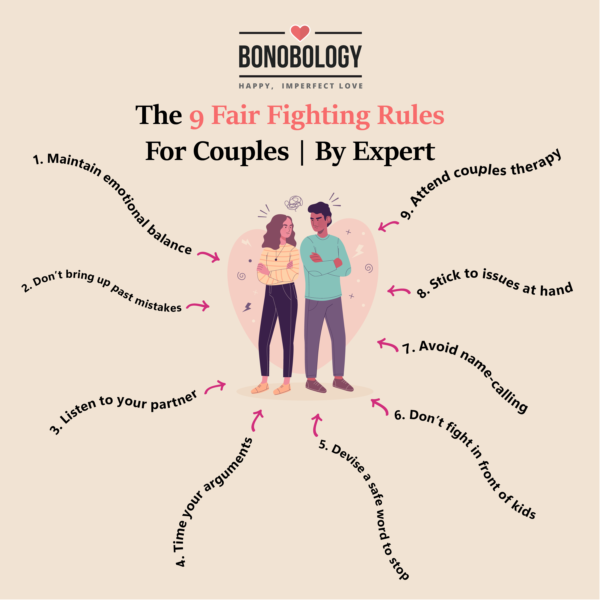There is not a couple that has not had disagreements. Some resolve them amicably, while others not so much. The latter may need a healthy dose of fair fighting rules to wade through this arguably (wink!) tricky territory. The concept of fair fighting rules for couples is laced with plenty of questions. Why the rules? Or, is it possible to follow such regulations in a heated argument?
It may feel overwhelming as an idea – a regulator for arguments. But, imagine what if we imbibe these early on in a relationship? Won’t the conflict reduce or at least get resolved without damage? To elaborate more on this mature concept of fair fighting rules, I have roped in clinical psychologist Devaleena Ghosh (M.Res, Manchester University), founder of Kornash: The Lifestyle Management School, who specializes in couples counseling and family therapy.
What Is Fair Fighting In A Relationship?
Table of Contents
In his book After the Honeymoon, psychologist Dan Wile says, “When choosing a long-term partner, you will inevitably be choosing a particular set of unresolvable problems.” Conflict, therefore, is an inevitable part of all relationships. It wouldn’t be far-fetched to say that conflict is even healthy for relationships, allowing two people to understand each other better and develop mutual respect and trust. Having said that, it’s important to figure out what kind of a fighter you are and the things you get triggered by.
- Do you get angry easily?
- Do you bottle up everything inside of you until it all explodes with a small trigger?
- Do you avoid conflicts at all costs?
- Do you withdraw and refuse to interact?
- Do you take your partner’s criticism personally and react accordingly?
All of us have different styles of experiencing, dealing with, and showing anger. It is only reasonable that some ground rules for fighting fair in marriage be established between a couple so that fights are handled fairly, with an aim to find the easiest resolution of the conflict without possible miscommunication. Otherwise, a conflict can easily get overwhelming and take a chaotic form.
Imagine a couple, A and B. A withdraws whenever they have a fight while B tends to take their partner’s anger personally. This difference can easily escalate a small conflict into a big one if the couple doesn’t establish some ground rules that allow them to handle the conflict with the basics in order.
This couple should take each other into confidence and promise that they would never shut their partner out or engage in stonewalling during a fight. If A needs time and space, they will inform their partner and give them a time limit. For example, A could say, “This is getting overwhelming for me. Can we discuss this in the morning/after two hours/(other time limit)?” B should promise to respect A’s need for space and a time out.
This essentially is the idea behind fair fighting in a relationship. A couple can have their own rules depending on their individual needs and emotional baggage. But there are a few commonalities and basic ideas when it comes to learning how to fight fair in a marriage that all couples should adhere to, which we discuss ahead.
The 9 Fair Fighting Rules For Couples As Per Experts
Devaleena says that communication is the key to setting fair fighting rules among couples. “Two partners can sit down at a peaceful time and set down some ground rules in a relationship. They can promise one another to not become completely uncivilized during an argument. Such a discussion will prepare them to control an argument, when or if they get into one,” she says.
Devaleena also says that rules, as a concept, provide structure to anything or a safe zone to operate in. This comfort, she says, also applies to relationships. “When the rules are broken, it can hurt somebody or unhinge the functioning of an institution. Something similar can happen to relationships – one partner may get hurt,” she says. Now that we have established why these are important, let us look at some fair fighting rules that can help couples rein in their disagreements.
1. Maintaining emotions and tone are among fair fighting rules
Any quarrel with your spouse or partner could be a scarring experience and can render you anxious. Without you having intended it, things could escalate and slither out of control immediately. Thus, maintaining emotional balance is simply imperative, and it is among the fair fighting rules that could potentially save your relationship from a bumpy road.
Fair fighting rules for couples who are looking forward to relieving stress and perfectly balancing emotions involve a lot of talking. At all times, you must attempt to express your concerns in a balanced way before they snowball into a major issue. Be mindful of your tone – it may become harsh if your emotions tip toward anger.
It is advisable to keep the tone composed. Because when you yell, perhaps your partner could mirror your behavior. And, before you know it, your argument could turn into a verbal war zone. If you feel like you are losing control of the argument, resort to sporadic breaks. These pauses too are among fair fighting rules for resolving conflict.
2. Do not rake up the past to resolve conflict by fighting fair
Bringing up past blunders does not amount to fighting fair to resolve conflict. It will only make your partner feel miserable and make them resent you. Resentment is the monster you do not want sitting in the middle of your relationship. “It is essential to stay in the present while fighting,” says Devaleena, adding, “Past is a place best not visited because what’s done is done. Regurgitating past issues will only create new problems.”
Further, digging up the past could have an undesirable effect on the partner, who may have worked on their mistakes. It may put them back in the zone that makes them relive the sting of their errors. So, it could be personally damaging. Fair fighting rules entail shunning all behavior that could aggrandize personal problems.
Related Reading: 12 Signs Your Past Relationships Are Affecting Your Present Relationship
3. Be constructive, listen and engage while trying to fight fair
A lot of fair fighting rules for couples involve the word “constructive” – your arguments need to be constructive and your end goal should be to achieve a constructive solution as well. After all, you just do not want to unleash your anger, using it as a trough to stall the progress of your relationship. So, to resolve an ongoing conflict, you may want to listen better to one another first.
Listening is among the hard fair fighting rules. It is perhaps easier to lose control (than to maintain restraint) and when that happens, it is difficult to see past red-hot anger. Besides, you may want to assume what your partner would say in an argument because you believe you know them so well. However, such flawed thinking has no place on the list of fair fighting rules in relationships. Allowing your partner to express his or her feelings could release the trapped tension and gently guide you toward the end of the conflict.
If you tend to go silent during a fight because you hate conflict, you must resist that urge to withdraw and stonewall your partner. A research study titled Demand-Withdraw, Couple Satisfaction And Relationship Duration says, “There is clear evidence that demand-withdraw interaction pattern, a pattern in which one partner seeks change and discussion of a problem, while the other avoids the conflict, is concurrently associated with couple dissatisfaction.”

4. Timing the arguments – An essential fair fighting rule for couples
If you don’t keep fair fighting rules in mind while arguing, things may go out of control and tax you physically. Your mind and nerves can only take so much. So when necessary, agree to take a break when you fight – it will not just help you clear your mind but may also allow you to evaluate your thoughts.
It wouldn’t be wrong to say that one of the essential fair fighting rules for couples is setting a time limit on conflict-centric discussions. Jenna and her partner, Sullivan, did so after consulting with a psychologist, who told them that they could pause their fights for 20 minutes to prevent things from getting out of hand.
“It was pretty evident that our differences were not going to be resolved in one conversation and thus we needed fair fighting rules for resolving conflict,” said Sullivan, adding, “So, we decided to take breaks. It was difficult at first but works wonderfully for us now. After every pause, I wanted to hear what Jenna had to say and vice versa. We would often want to hug each other and move on for the moment.”
Even if you do not move on, you could still acquire enough composure to rethink the dispute. Jenna said that even if the matter did not subside during the pauses, it gave her a lot to think about and even helped her gain control of her anger. “I would often want to think about it for a few days before the topic was broached again,” she adds.
5. Devise a safe word to stop arguments from escalating
Efficient fair fighting rules for couples include devising a safe word. This word – mind you, it has to be a word and not a phrase – can be used to stop an argument when you feel it is venturing into ugly territory. This word, however, must contain an absolute promise that you will either tone down or stop arguing when it is used.
This safe word must be agreed upon by both partners and treated as a solemn contract. Because, if you do not abide by it in an argument, it would amount to breaching a promise. No amount of tips for fighting fair in marriage/relationship amount to anything if there is a lack of trust between partners. Keeping promises is crucial for strengthening the bond of trust.
Related Reading: 7 Strategies To Stop Fighting In A Relationship
6. Don’t drag children into the mess if you want to fight fair
If you have children, they could end up becoming undesignated victims of your arguments. Your incessant fighting could have an adverse effect on their developing psyche and the ramifications that could well stretch into their adulthood. Thus, children are one big reason why fair fighting rules for couples must be integrated into a relationship.
“Children can get insecure if they realize that they are being used as weapons in an argument. They may develop behavioral issues and may feel abandoned,” says Devaleena. Fair fighting rules also include not arguing in front of children. Kids often feel like they have scanty control over their environment, and when their parents enter into an argument, they could be easily overwhelmed – their whole world could take an uncertain tone.
Besides, the kids may start believing it is their fault. This could potentially lead to a self-blaming cycle. Couple fair fighting rules could prevent this problem from taking root.

7. Avoid name-calling while fighting fair to resolve conflict
Arguments could be compared to flammable substances, they require one spark or one wrong move to turn hazardous. In a fight, name-calling could play the role of the spark that could turn the situation volatile. Simply put, name-calling can damage your relationship further. Fair fighting rules dictate that you must steer clear from it at all costs.
Everything said or done during a fight can have a large impact. Even if you take their pet names sarcastically or patronizingly, you could end up turning minor problems into gaping wounds. Being civil is one of the most important ways to fight fair in relationships as it ensures that decency and mutual respect are maintained.
8. Stick to the issue at hand if you want to resolve conflict
The anger triggered by an argument can often spill in different directions. You may have started arguing about one thing and soon may find yourself fighting about a completely different issue. It could lead to a lot of resentment building up in a relationship. “Before a couple starts fighting, there is a buildup followed by a flood of emotions. Consequently, a lot of unpleasant words are exchanged,” says Devaleena.
To prevent this from happening, fair fighting rules for couples include segregated arguments. Tackle one issue at a time if you aim to resolve it amicably. “A good way to stay with the issue at hand is to write it down somewhere. Some partners even exchange notes on what is bothering them. Talking to a friend or a family member about your topic of argument can also help you understand your own position and prevent you from digressing,” advises Devaleena.
Also, try to avoid the my-way-or-the-highway attitude. Compromise is a key element for couple fair fighting rules because not all arguments will end with a solution that augurs well for both partners. Sometimes, the resolution can be skewed. And this is when you have to bring understanding into the conflict.
9. Seek counseling to know more about fair fighting rules for couples
If you haven’t been able to act within the framework of fair fighting rules, you may want to seek help from counselors. They can often chart out ways for you to minimize your problems, to set the ground for your arguments so that they do not waver into problematic territories – in short, they will help you in fighting fair to resolve conflict. If you are having a hard time navigating the tricky space of relationship arguments, skilled and certified counselors on Bonobology’s panel are just a click away.

Key Pointers
- Conflict is an inevitable part of all relationships, even healthy, allowing two people to understand each other and develop mutual respect and trust
- All of us have different styles of showing anger, experiencing it and dealing with it. It is only reasonable that some ground rules for fighting fair in marriage be established between a couple so that the fight is handled fairly for easiest resolution of the conflict without possible miscommunication
- Maintaining emotions and tone, not raking up the past, being constructive and listening, having a time limit to the fight, devising a safe word are some of the many ways to fight fair in relationships
- Other tips for fighting fair in marriage include not dragging children into the fight, sticking to the issue at hand and avoiding name-calling
- It is advisable to seek counseling to learn how to fight fair in marriage and relationships
It is prudent to remember that disagreements are a part of life. However, there is wisdom in knowing how to negotiate or set fair fighting rules in relationships so that they can stay healthy. “Meanwhile, an argument can also be repaired midway if one partner decides to stop quarreling. It is for the greater good,” says Devaleena.
Fair fighting rules for couples can help them express themselves instead of avoiding conflict. Who knows, the resolution and the fairness may even help couples understand each other at a deeper level.
FAQs
To know how to fight fair in a marriage you need to be committed to a few ground rules. Keep in mind things such as listening to your partner, avoiding name-calling, not bringing up past mistakes, devising a safe word, timing the fight and not dragging children into the mix. A couple can also have their own set of rules in addition to this that respect their individual emotional boundaries and needs.
It is difficult to say how much fighting is OK. Generally speaking, conflicts in relationships are inevitable and even healthy when handled correctly. What is important to note here is not how much a couple fights but how well they fight. The fighting should not feel overwhelming to the couple with no healthy resolution at the end. If your fights end with the feeling of having come closer to your partner, and there being a sense of satisfaction of having a positive solution, then you shouldn’t be worrying about how much you are fighting.
9 Things To Do When Every Conversation Turns Into An Argument
When Is It Time To Divorce? Probably When You Spot These 13 Signs
Your contribution does not constitute a charitable donation. It will allow Bonobology to continue bringing you new and up-to-date information in our pursuit of helping anyone in the world to learn how to do anything.








Featured
How To Stop The Cycle Of Fighting In A Relationship – 11 Expert-Recommended Tips
Your Guide To The Basics Of Hug Etiquette
9 Signs You Have Serious Communication Issues In Your Relationship
The Red Flag Conversation
How To Love Yourself And Your Body Irrespective Of Society